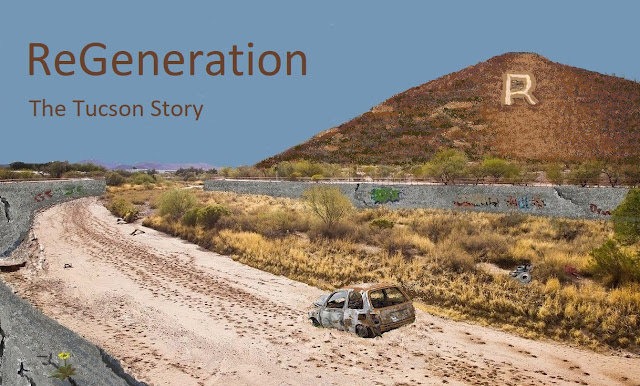One of the first things that made me fall in love with Tucson was the traces of cultures from the
people who came before us. You don’t have to look far to see the influence of those who built the Old Pueblo - in our famed Mexican food, music and art. But dig a little deeper.
Mission Garden boasts a living museum about the history of agriculture on this Tohono O’odham land: from the T.O. garden plot to the drought tolerant heritage fruit trees from the time of Father Kino. Some of our modern rainwater harvesting techniques evolved from Tohono O’odham ak-chin agriculture. And low-water gardening techniques have been used by Abuelas and Abuelos for generations. I was inspired by both of those cultures. It was important to me to be respectful while highlighting their contributions.
As climate change progresses, I feel it is vital for all our communities to work together on sustainable solutions. That theme is woven into the play. I wanted to make sure that those voices were as authentic as possible. In addition to doing research on the different cultures, I had members of those communities give me feedback on how their people were represented. I listened to their concerns and suggestions then implemented them into the script.
Andrew Trever, who plays Alex,
wrote in his bio, “I joined the ReGeneration project because as a young Latinx person it spoke volumes to me to be able to work with such a diverse cast and to be able to talk about a subject that affects me and the very town I call home.”
I tried my best to cast actors of the correct ethnicity for the main characters. That presented a real challenge. After an exhaustive search for the Latino brothers, I eventually had to cast older actors for those roles. Eduardo Rodriguez, who plays fourteen-year-old Rogelio, is actually a Pima Community College graduate. Eduardo impresses me every day by how well he has portrayed the much younger character. I was so blessed to find Tierra Domingo, a young Tohono O’odham woman to play Ha:san. I relied on Tierra to make sure her character and her tribe’s customs were authentic. She even recruited her little sisters for the storytelling scene – all donned in their traditional Tohono O’odham dresses!
Tierra recently shared her experience in her tribe’s newspaper, The Runner. I hope
ReGeneration: The Tucson Story inspires our Tucson community to work together to make sure Tucson thrives into the future…and maybe plant some low-water regenerative gardens and native trees nourished by the rain.
You can watch the virtual premiere of
ReGeneration: The Tucson Story and a short film Tierra made with her sisters on Youtube.
https://youtu.be/Zv7iX0Tw3dA














